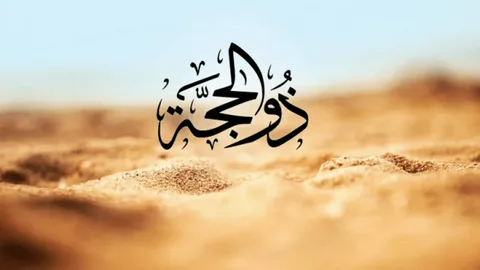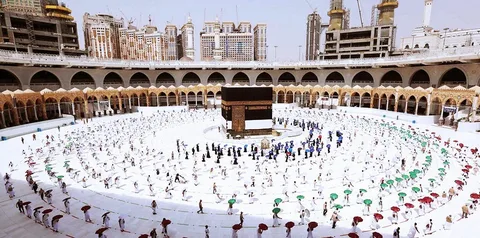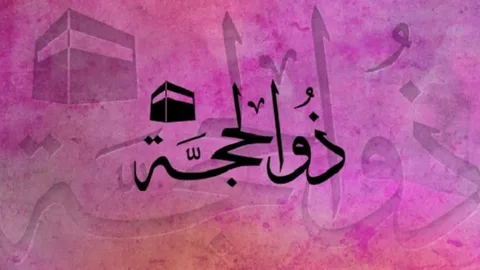Understanding the twelfth and final month in the Islamic lunar calendar, Dhul Hijjah holds immense significance for Muslims worldwide. This period is marked by key events including the Hajj pilgrimage, the Day of Arafah, and Eid Al-Adha. Each moment within this month offers unique opportunities for spiritual renewal, communal benefits, and personal growth, in this article on Arabian Tongue website we will explorer benefits of dhul hijjah.
benefits of dhul hijjah

Dhul Hijjah, the twelfth and final month of the Islamic calendar, holds significant spiritual and communal importance for Muslims around the world. Here are some of the key benefits of this sacred month:
Spiritual Benefits
- Renewal of Faith Dhul Hijjah presents a prime time for Muslims to reconnect with their faith. The first ten days are considered the most sacred days of the year, encouraging increased prayer, Quran reading, and remembrance of Allah.
- The Virtues of Specific Days The Day of Arafah, the ninth day, is particularly significant. Fasting on this day can atone for the sins of the preceding and upcoming year, making it a powerful moment for spiritual cleansing.
Social and Community Benefits
- Fostering Unity The communal practices during Dhul Hijjah, particularly the Hajj pilgrimage, unite Muslims from diverse backgrounds, promoting a spirit of brotherhood and equality.
- Charity and Giving This period encourages increased acts of charity and support for the less fortunate, reinforcing the social responsibility of Muslims to aid their community.
Personal Development
- Self-Reflection The sacred days provide a chance for deep self-reflection, helping individuals assess their life goals and spiritual health.
- Commitment to Self-Improvement Many use this time to make new resolutions for better habits, particularly in their personal and spiritual lives.
Health and Well-being
- Fasting and Its Advantages Fasting on the Day of Arafah is believed to offer health benefits that include detoxification and mental clarity.
- Mental Health and Spiritual Peace Engaging in spiritual activities during this time can significantly alleviate stress and enhance overall mental well-being.
Economic Impact
- Increased Charitable Donations The emphasis on charity during Dhul Hijjah boosts economic support to those in need, providing a substantial inflow of aid.
- The Hajj Economy The pilgrimage generates significant economic activity, benefiting local businesses and the wider economy.
Cultural Significance
- Traditions and Practices Dhul Hijjah is rich with cultural practices that vary from region to region, enriching the cultural tapestry of the Muslim world.
- Global Muslim Solidarity This period demonstrates the unity of the Ummah, showcasing a harmonious global identity.
The Day of Arafah

The Day of Arafah is one of the most significant and spiritually rewarding days in the Islamic calendar, occurring on the 9th day of Dhul Hijjah, the last month of the Islamic lunar year. It is the day before Eid al-Adha and is central to the Hajj pilgrimage, although its significance extends to all Muslims regardless of whether they are performing Hajj.
Significance of the Day of Arafah
The importance of the Day of Arafah stems from several Islamic teachings and traditions:
- Culmination of Hajj: It is on this day that Muslim pilgrims gather at the plain of Arafat, near Mecca, to stand in prayer and supplication from noon until sunset. This gathering is known as the “standing before Allah” (wuquf), and it is considered the pinnacle of the Hajj pilgrimage.
- Forgiveness of Sins: The Prophet Muhammad stated that there is no day on which Allah frees more people from the Fire than on the Day of Arafah. He mentioned that Allah draws near and expresses His pride to the angels and says what do these people want and seek forgiveness for them.
- Fasting: While not mandatory, fasting on the Day of Arafah is highly recommended for non-pilgrims. It is believed that fasting on this day expiates the sins of the past year and the coming year.
Practices on the Day of Arafah
For those at Hajj and those who are not, the Day of Arafah is a day devoted to deep prayer and reflection:
- For Pilgrims: The pilgrims spend the day at Arafat in deep prayer and supplication. The focal point is to seek forgiveness and make personal supplications. It is a moment of reckoning, reflection, and renewal.
- For Non-Pilgrims: Muslims who are not performing
Wajibat of Hajj are encouraged to fast on this day. They also engage in increased prayer, recitation of the Quran, and making supplications (dua). Mosques often hold special prayers and lectures emphasizing the importance of the day.
Eid Al-Adha: The Festival of Sacrifice
Eid Al-Adha, known as the Festival of Sacrifice, is one of the most important Islamic festivals and is celebrated worldwide. It falls on the 10th day of Dhul Hijjah, the last month of the Islamic lunar calendar, immediately following the Day of Arafah, which is the most important day for those performing the Hajj pilgrimage in Mecca.
Religious Observances and Practices
- Takbir: From the morning of Eid until the end of the four-day event, Muslims recite the Takbir, which declares God’s greatness.
- Eid Prayer: On the morning of Eid, Muslims gather in large groups in mosques or open areas to perform the Eid prayer, consisting of two units of prayer followed by a sermon.
- Sacrifice (Qurbani): The act of sacrifice involves slaughtering an animal, usually a sheep, goat, cow, or camel, in an act that symbolizes Ibrahim’s sacrifice. The meat from the sacrifice is divided into three parts: one-third for the family, one-third for friends and neighbors, and one-third for the needy.
FAQs
What are the first ten days of Dhul Hijjah known for?
The first ten days of Dhul Hijjah are considered the most sacred days of the year in Islam. They are known for their great spiritual significance and the rewards that good deeds bring during this period. Muslims are encouraged to engage in increased prayer, fasting (especially on the Day of Arafah), charitable acts, and recitation of the Quran. These days culminate in the festival of Eid Al-Adha.
How can non-pilgrims benefit from Dhul Hijjah?
Non-pilgrims can benefit from Dhul Hijjah by participating in many of the virtuous activities recommended for these days. This includes fasting on the Day of Arafah, increasing acts of worship and charity, and making sincere repentance. It is a time for renewing one's faith and commitment to Allah’s commands, reflecting on personal conduct, and making meaningful life improvements.
What is the significance of the Day of Arafah?
The Day of Arafah, the ninth day of Dhul Hijjah, is considered the most important and blessed day of the Islamic year. It is the day when the pilgrims gather at the plain of Arafah near Mecca to pray and repent, which is the climax of Hajj. For those not on the pilgrimage, it is highly recommended to fast, as fasting on this day expiates the sins of the past and coming year.
How does Eid Al-Adha reflect the concept of sacrifice?
Eid Al-Adha, also known as the Festival of Sacrifice, commemorates the willingness of Prophet Ibrahim (Abraham) to sacrifice his son Isma'il (Ishmael) as an act of obedience to God, before God provided him with a ram to sacrifice instead. This event is reflected in the practice of Qurbani, where Muslims who are financially able sacrifice an animal like a sheep or a goat, distributing part of the meat to the needy, thus emphasizing sharing with others as an act of piety.
What measures are taken to ensure sustainability during Hajj?
To manage the environmental impact of the large gatherings during Hajj, various measures are implemented. These include the promotion of recycling, the use of water-saving devices, the management of food waste, and efforts to increase environmental awareness among pilgrims. The Saudi government and various organizations also engage in regular cleaning and maintenance operations to ensure the sustainability of the holy sites.
Conclusion
Dhul Hijjah is not just a period of worship but a multifaceted opportunity for renewal, unity, and celebration. It encourages a holistic approach to life, benefiting not only the individual but also the community and the environment.


